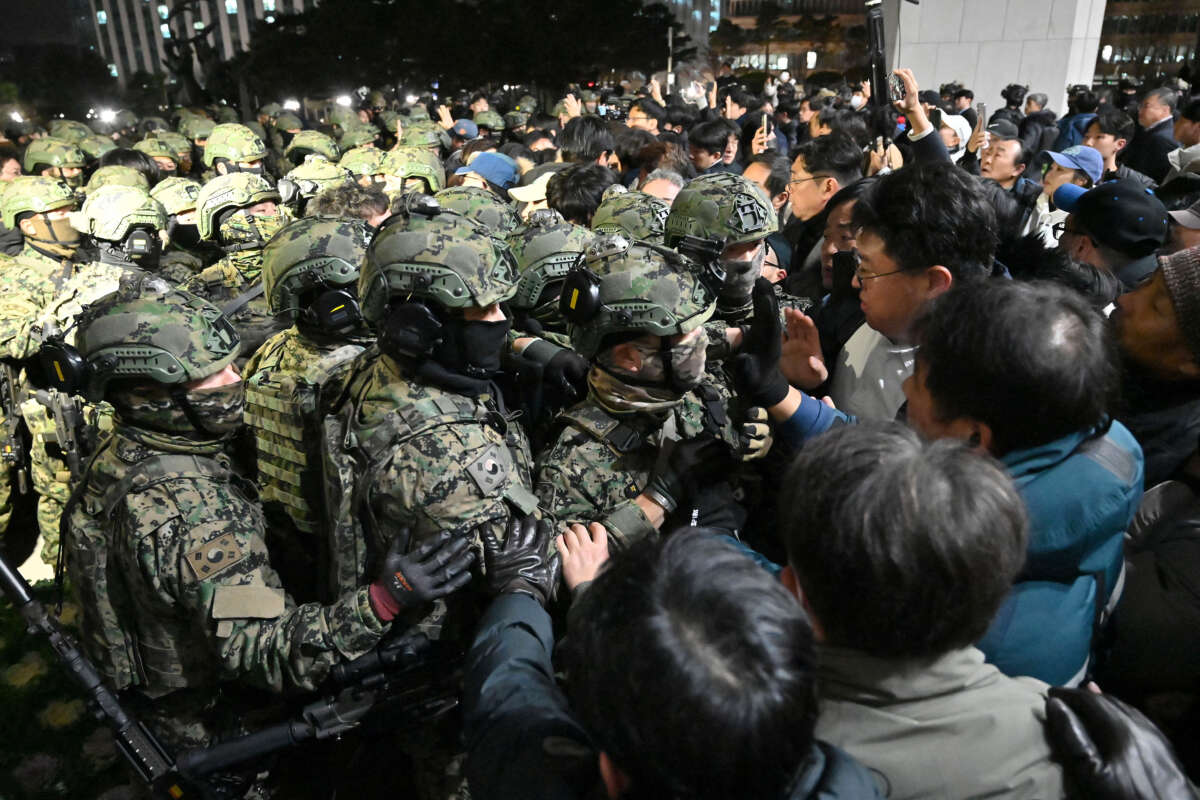Honest, paywall-free news is rare. Please support our boldly independent journalism with a donation of any size.
South Korea’s right-wing president, Yoon Suk Yeol, suddenly declared martial law across the country on Tuesday and then swiftly rescinded it after the self-declared anti-communist power grab was unanimously rejected by parliament and sparked a public mass uprising.
Late Tuesday evening, Yoon declared martial law, saying that there is a need to protect the country from “communist forces” and to eliminate “anti-state forces.” The decree prohibited all political activities, put all news publications under control of martial law and banned all labor activities like strikes or work slowdowns.
Members of the National Assembly, South Korea’s parliament, rushed to the chamber after the declaration, with one lawmaker saying that he had to climb over a wall to get past police and military who were blocking the building. Less than three hours after it was declared, parliament voted, 190 to 0, to reverse the edict.
Meanwhile, protests erupted in Seoul after the declaration. The Korean Confederation of Trade Unions, one of South Korea’s largest unions with over 1 million members, called for an “indefinite general strike” until Yoon resigned.
Even though the parliament voted to undo the declaration, military officials had reportedly pledged to continue enforcing it until the president lifted it, according to South Korean news channel YTN.
But then, just about six hours after Yoon’s surprise television conference, he rescinded his declaration, citing the National Assembly’s vote. It was the first time martial law had been declared in South Korea since 1980, when it was declared under a fascist dictatorship propped up in part by the U.S.
Yoon is a scandal-plagued far right leader who has massively expanded the oppressive security state within the country since he was narrowly elected in 2022. President Joe Biden has been criticized for his warm relationship with Yoon, saying he is a “great friend” and maintaining diplomatic relations. The Biden administration refused to condemn the martial law declaration on Tuesday, only expressing “concern” over “developments we are seeing on the ground,” as a White House spokesperson said.
“Certainly it is our hope and expectation that the laws and regulations of a particular country are abided by that particular country,” said State Department deputy spokesperson Vedant Patel at a news briefing. “Ultimately, we want to see these political disputes resolved peacefully and in accordance with the rule of law. And of course, such a vote in the legislature would be consistent with that approach.”
Yoon had already faced mass calls to resign prior to Tuesday, facing accusations of abusing his veto power to advance his own interests, including vetoing a bill to investigate his wife for allegations of stock manipulation; legislation to investigate a 2022 crowd crush that killed 159 people in Seoul; and a bill to probe the death of a marine seemingly caused by negligence within the military.
Media that fights fascism
Truthout is funded almost entirely by readers — that’s why we can speak truth to power and cut against the mainstream narrative. But independent journalists at Truthout face mounting political repression under Trump.
We rely on your support to survive McCarthyist censorship. Please make a tax-deductible one-time or monthly donation.
